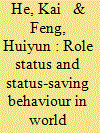| Srl | Item |
| 1 |
ID:
145881


|
|
|
|
|
| Summary/Abstract |
The extant literature on alignment behavior has focused primarily on the macro dimensions, i.e. the typology, manifestations and implications of states’ alignment choices vis-à-vis the great power(s). Relatively few studies have examined the micro aspects of alignment choices. This article attempts to fill in the gap by unpacking the constituent component of weaker states’ alignment decisions, with a focus on ASEAN states’ hedging behavior in the face of a rising China in the post-Cold War era. It contends that the enduring uncertainty at the systemic level has compelled the states to hedge by pursuing contradictory, mutually counteracting transactions of ‘returns-maximizing’ and ‘risk-contingency’ options, which seek to offset the potential drawbacks of one another, as a way to project a non-taking-sides stance while keeping their own fallback position at a time when the prospect of power structure is far from clear.
|
|
|
|
|
|
|
|
|
|
|
|
|
|
|
|
| 2 |
ID:
123672


|
|
|
| 3 |
ID:
184951


|
|
|
|
|
| Summary/Abstract |
Most research on status in international politics focuses on a state's ‘trait status’, defined by valued attributes that a state possesses, but ignores the importance of ‘role status’, which is constituted through state interactions and competent practices in world politics. By integrating prospect theory and role status scholarship, this article introduces a ‘status-saving’ argument to shed light on how states adopt risk-acceptant strategies to salvage the decline in their role status in world politics. We test the status-saving argument by examining the ASEAN states’ bold community-building efforts in the early 2000s, especially the adoption of the ASEAN Charter in 2007. We argue that both the economic and political conditions of ASEAN were far from mature enough to pursue such an institutionalization and legalization endeavour. The perceived decline of international role status after the 1998 Asian financial crisis, however, encouraged the ASEAN states to take this ‘great leap forward’ behaviour towards regional integration, which has placed ASEAN's long-term status and internal unity in a more risky and vulnerable position. We conclude that pursuing role status is another way for states, especially rising powers, to seek status in a deference hierarchy. Dominant powers should consider accommodating the pursuit of role status by rising powers and encourage ‘do-goodism’ in world politics.
|
|
|
|
|
|
|
|
|
|
|
|
|
|
|
|